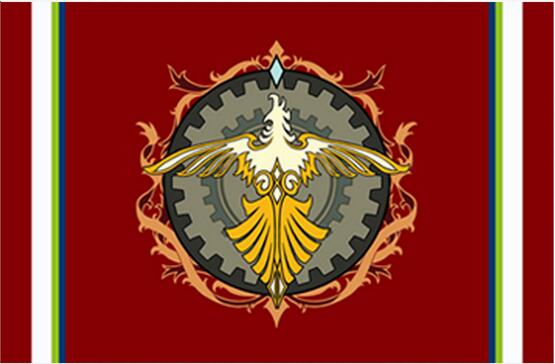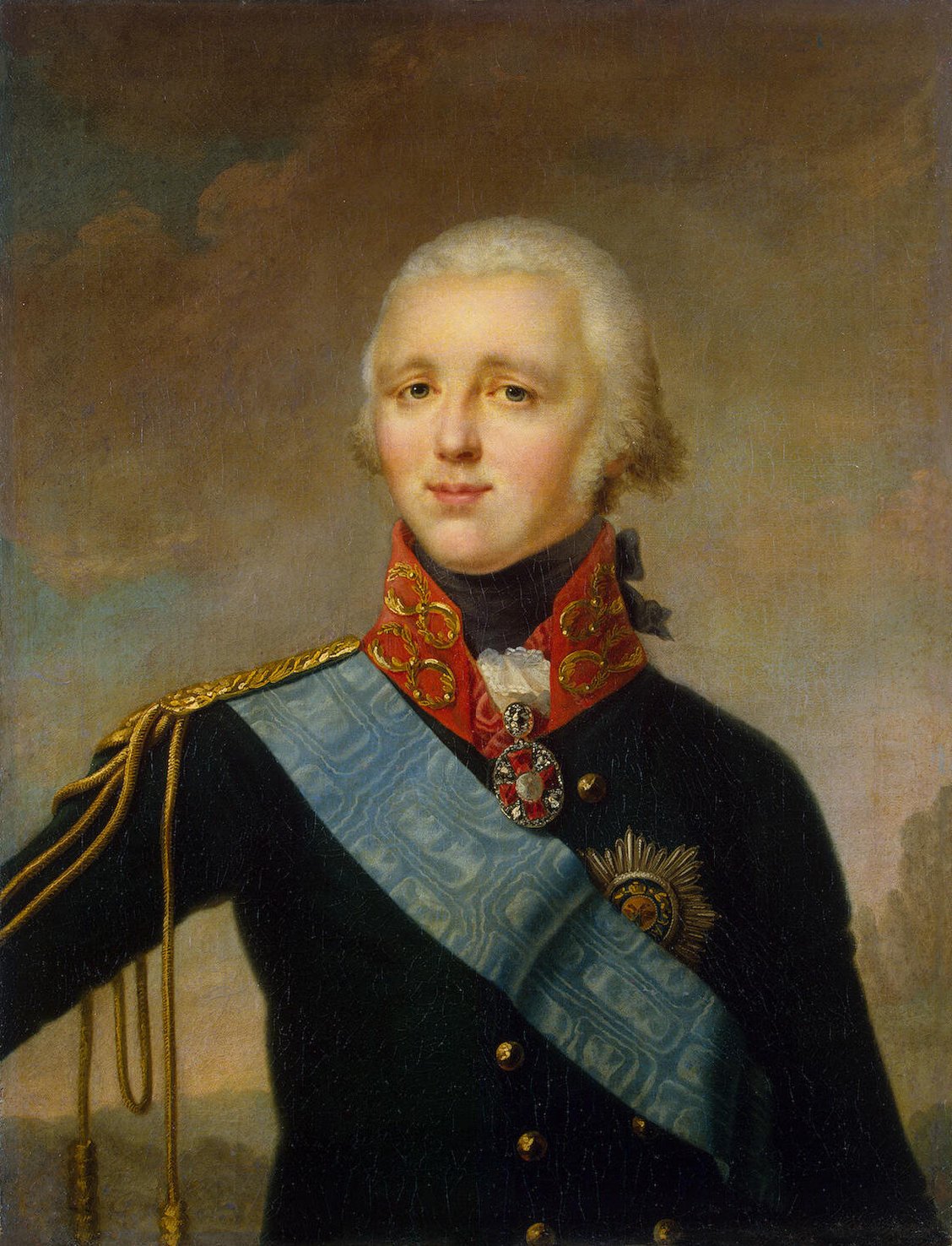Age of Nations
Turn 4: October, 1816 to March, 1817
Turn 4: October, 1816 to March, 1817
The world was rebuilding, nearly two years after the fall of Cato. Trade flowed freely across the Continent and relations were being mended. Among the most interesting events across the nation was the Conference of Sovereignty, held by King Richard Stuart II on November 1st, 1816. With the complete destruction of Cato and the Civitan threat now behind them, the conservative Stark party, named so after Leonard Stark, Prime Minister since 1814, wished to see the colonies "readjusted" following the lackadaisical policy approach of their governance during the war. All eight colonies sent representatives, and the conference was underway.
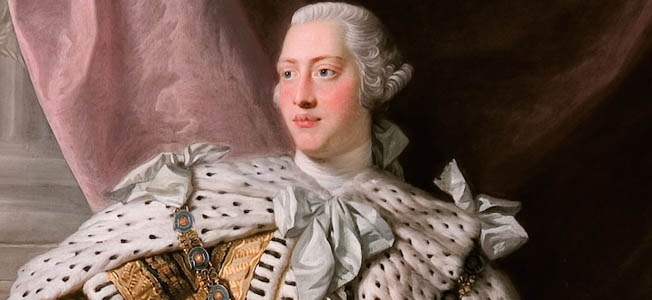
King Richard Stuart II, circa 1816
King Richard, abetted by Prime Minister Stark, handled the negotiations himself. The Merrick Isles off the coast of Mateen sent Lord Bartholomew Hasselbeck, the Viceoy of the Merrick Islands. Hasselbeck, a former army officer who fought Civitan rebels during the Mateen Campaign (1803-1804) was a resilient and confident administrator. King Richard stumbled here briefly, failing to sell the new restrictive policies of centralization, irrevocably angering Hasselbeck, who left the conference before it's conclusion. [+4 Unrest in Merrick Isles]

Merrick Islands, circa 1816
The ambassador from the Katar State, a former Seljuk territory taken in the 1630's during one of the Seljo-Gilbradian Wars, was Kenneth Mardow. An aristocrat from the well to do Mardow family, Kenneth spent little time in the very colony he was responsible for governing, instead spending his summers on the Lavarattian coast chasing exotic women and drowning himself in drink. A sycophant to the crown and sympathetic to any who would help him maintain his position, Kenneth agreed to the restrictions of trade set down in the policy without argument. [+3 Economic Rating/Year]

Katar State, bordering the Seljuk Empire, circa 1816
The remaining six colonies, spread across Faresia and Serranthia, submitted without much qualms. The fact was that the mere threat of a Gilbradian fleet on the horizon was enough to keep the colonial administrators in line. The Imperial Conference ended with the colonies that much closer in line with the Gilbradian international values, except for the Merrick Isles, which struggled to remain complacent in a world where the tiny islands contributed heavily to the Gilbradian trade economy. The slogan in Merrick was, "Merrick won't be forgotten," a testament to the War where Civitan rebels rose up and the Gilbradian Royal Army was sent, then turned back around at the threat of invasion by Cato himself.
In Norstra, the King of Marnland, Benedict IV of Marnland & the Principality of Kalubia, signed a trade agreement with the Empire of Vornehm--adding in a promise of it's cancellation in 1820. Benedict IV was a stark isolationist and feared growing dependence on Continental trade to fuel the agrarian economy of his nation.

Marnish painting entitled "Norstran Winter," by Adolf Finnius, 1799
The news that remained in headlines however was the fate of the Marnish ship Vahterpää. Built in 1788, she ferried supplies to the Continent during the War. Assigned to the Weichendorf-Nokia trade route, she set sail on December 4th, 1816 carrying 420 tons of iron ore. It was the last time she was seen. When she failed to arrive, King Benedict IV's foreign minister Eemil Nestor Setälä gave a rousing speech in the Senate of the Marn, the major parliament building of the state. In it, he said: "And this, brothers, is why I forbid the continuation of trade with Continental powers. Their carelessness to their Nostran brothers has cost us the lives of ninety-eight sailors of the Marn!"
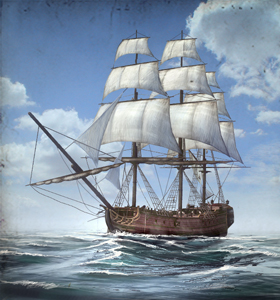
Marnish trade sloop, Vahterpää
Papers in Naardan, Svea, Aontas and even Zeelia followed the story with great interest. The Mystery of the Vahterpää became front page news. Theories abounded within days--that the Vahterpää was carrying secret documents regarding the invasion of Svea, or that some Vornehm prisoner was aboard. An Aontan paper's front page on December 15th read: "Who is hiding the Vahterpää?" A hastily assembled Vornehm delegated aboard the trade ship Frauenlob that lasted from December 16th to December 25th reported that the ship probably sank due to bad navigation in the often frigid Smaragd Sea. Given it's small size however, the Marnish Foreign Office rejected this explanation, explaining in a report: "Losing a ship in the Smaragd is like losing a pebble in a bucket."
In the Kingdom of Dallin, an economist named Soren Rhodes publishes his treatise on base economics titled: The Properties of Wealth and Debt in the Nation State. Already in his sixties, Rhodes helped outline simple economic principles for the Dallin economy that helped create several preferable trade agreements with neighboring Azreka, a country that Rhodes spent nearly half his life in, teaching and studying. The principles of his treaty explained: Kings have always run up debts, borrowing money (sometimes at sword’s point) from subjects and great banking houses. The debt, however, was the personal responsibility of the king. The concept of national debt allows a nation to borrow to finance expansion and conquest. The nation sells bonds, and agrees to pay interest on those bonds every year. This simple idea increases the growth of national wealth and facilitates expansion by reducing upkeep costs.
Hathowayian economist, gambler, and rake Marcus Lorram (1671-1729) made several advances in his field, the most notable being the introduction of the Azrekan national bank. He also proposed state control over national finances and trade. He manipulated the market by using money from monopoly trading companies to buy government bonds rather than investing in overseas enterprises. Eventually his schemes collapsed, and many Azrekans were ruined. Lorram failed, but he gave the idea of government-backed bank notes, and the word “millionaire”, to the Continent." [Kingdom of Dallin unlocks National Debt: [Can go -150 Debt without any Unrest. Recruit Soldiers costs 1 Economic Rating less.]

Dallin economist Soren Rhodes, circa 1789
Diplomats from the Kingdom of Vettucci visited the Batifegalé Empire in January of 1817. Several minor agreements were signed, establishing free trade between the two nation as well as open ports for citizens of the two nations. While many believed a certain laziness had fallen over the nation, no such thing seemed prevalent. The overall pessimism of the nation seemed only genuine in the government, as t he Batifegaléan economy was growing at a much stronger rate than it's neighbors, yet Queen Mariana Varejão-Medellin II seemed adamant that her Empire wallowing in the shadows.
A bright spot in the darkness was Queen Mariana Varejão-Medellin II's 37th birthday. With the budget nearly being cleared and the nation almost out of debt, the question arose on the cost of the monarch's birthday. An extravagant affair could help turn attitudes around, while a more frugal approach would help with the national treasury.
On February 1st, the 22nd Gilbradian Regiment landed at the Seljuk port of Cersin. While construction of a formal Gilbradian embassy began immediately, the 22nd Gilbradian Regiment made no efforts to downplay their pursuit. Without orders to remain in Cersin or route out the enemy, they advanced, under Colonel Marvin Hawkins, north toward Terkavia. Operating independently, the Regiment intended to test the Terkavian's taste for battle, and it was not long for wanting.

Gilbradian soldiers & officers, circa 1817
The Terkavians, having spent months training for an inevitable incursion by the Seljuks, attacked by the Gilbradians just as they left the Talesim Valley, the Battle of Talesim took place between February 4th, 1817. While the Gilbradian Royal Army was a determined and disciplined force, their equipment was not much better than the Seljuks they were aiding. Coming free from the valley, they were beset on several sides by approximately 6,000 militiamen on horseback. During the first three hours of battle, many Gilbradian soldiers reported running out of ammunition. [Combat Penalty due to 14% Preparation]
The Gilbradians, being attacked by a purely mounted force, were unfazed by the psychological impact of a wave of horse and men encircling their position. Colonel Hawkins ordered the men into an infantry square, a tactic perfected during The War. The cannons, stationed in the middle, were safe from attack. Ammunition was moved to the men in the center, giving them open reign to fire, while men on the outside affixed bayonets to hold the horsemen at bay. Most of the Takervians present were still woefully equipped, using bow and arrows or stolen Seljuk rifles.
 Gilbradian 22nd Regiment during the Battle of Talesim, 1817
Gilbradian 22nd Regiment during the Battle of Talesim, 1817With the sun setting behind them, the Terkavians eventually retreated north, leaving 1,100 men dead in their wake. The Gilbradians had lost 24 men themselves, 3 of whom were lost to heat exhaustion. Given their dire straits, Colonel Hawkins ordered the 22nd to return to Cersin to await further orders from Wosley. [Gilbradian Great Victory +3% Military Morale]
In Azreka, the Castle of Kamenets--abandoned since The War when the Kamenets family abandoned it for the North--is converted into a fortress. Situated between Livonia and the border of the Veldlands, it's conversion provides an excellent obstacle from either the Veldlands or Dallin to reaching Livonia. Pockmarked when it was used as a defensive bastion during The War, reconstruction efforts begin immediately and a half dozen cannons are installed along it's ramparts.
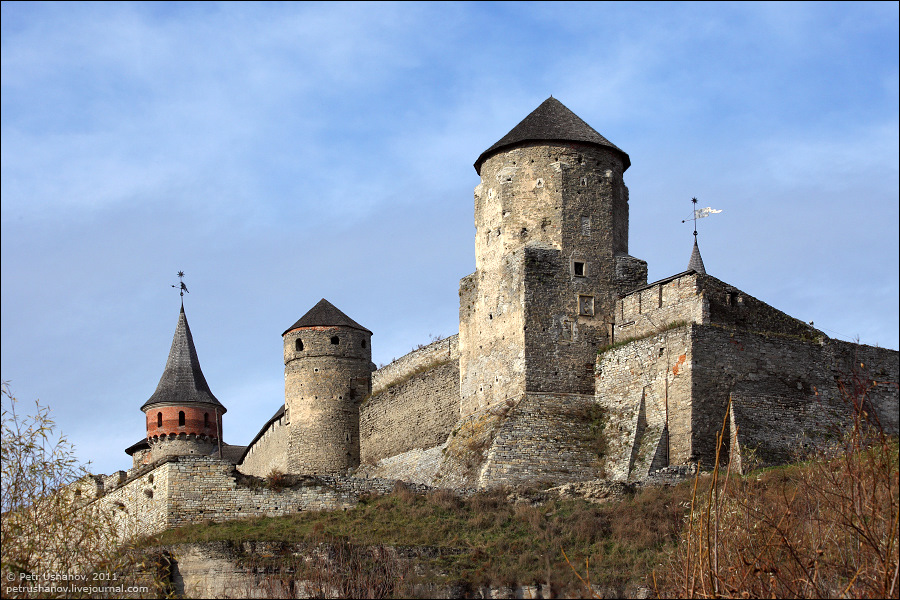
Kamenets Fortress
Azrekan diplomats met in the Seljuk city of Cersin to discuss trade negotiations. The Seljuk, while kind and humble compared to their attitude historically, regretfully rejected the offer for the time being, instead asking for renewed negotiations later in the year. A gift of $20,000,000 Azrekan ducats was added to incentivize the deal--which the Seljuks promised--for later in the year.
The Zeelian Imperial Army conducts a slew of military exercises to retrain several thousand of their new recruits. The Army is without a single leader however.
In the North, in the city of Ligested, Aontas, the world's first transportation industry begins. Gjensidige Allmennaksjeselskap, started in February, 1817 by Bjorn Gjensidige, is a transportation company using horse drawn carriages. The company, though small--is privately owned. Several local nobles take a trip from their manor to a local park. [Aontas gains Transportation Industry [Privatized], see Industry* page]

Gjensidige Allmennaksjeselskap opened it's doors with just six carriages in 1817
In the East, the Osladian Empire saw the rumblings of tension as the Diet officially announced Katerina Matzow would also become part of the Imperial Tsardom with Lubomir's passing. It was not the distant, rural communities that saw such upheaval but rather the educated elites in the major cities that saw their long standing authority threatened by a fracturing of their millennia long hegemony over Tsardom politics. Matzow's family was not embedded deep in the Tsardom; whether she was brave or naive was irrelevant. Lady Matzow did not adhere to the Old Ways, and that was a problem.
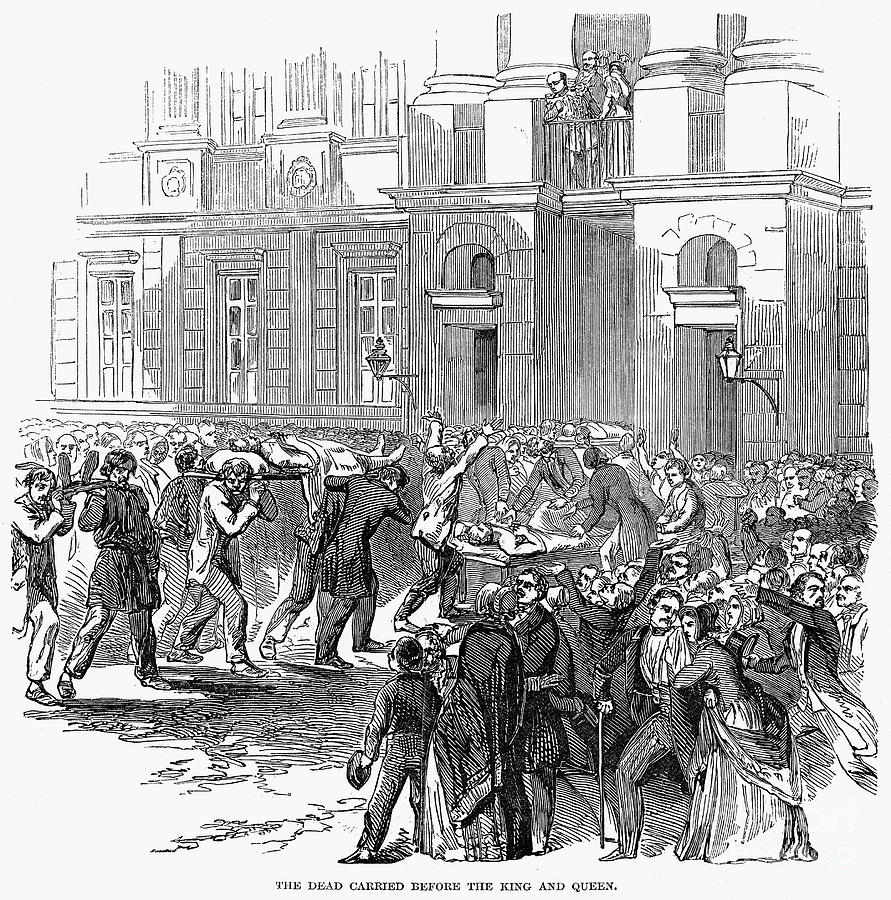
Riots in Tolyaslav, 1817
While the minor nobles in outlying territories and in Karamov, Sulov and Massau went up in arms, not all was ill. In the city of Kamerovs, the Aktien Gesellschaft der Auto-Fabrik vormals G. Sigl started. A fledgling transportation company. Run by Anton Hechkov, it ran small passenger routes along the city's exterior with it's exotic tailored carriages. [Oslad gains Transportation Industry [Privatized], see Industry* page]
NATIONS TO POST
- Oslad
- Aontas
- Zeelia
- Dallin
- Azreka
- Gilbradia
- Vornehm
- Batifegalé


